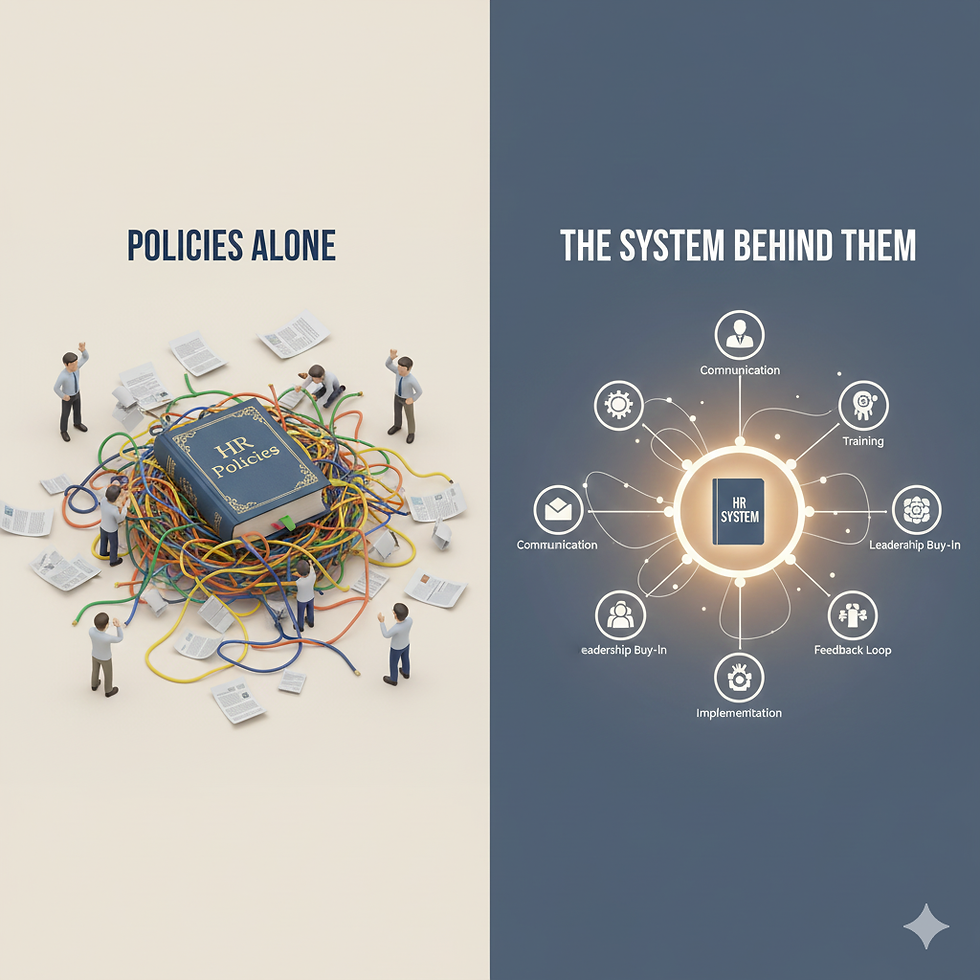Embracing AI and Automation in HR and Business Process Improvement: A Game Changer for SMEs
- Storme Paes
- Aug 28, 2024
- 3 min read

In today’s rapidly evolving business landscape, small and medium enterprises (SMEs) are constantly looking for ways to remain competitive, efficient, and agile. One of the most significant developments reshaping the way businesses operate is the integration of artificial intelligence (AI) and automation into HR processes and business process improvement (BPI). While once considered tools for large corporations, AI and automation are now increasingly accessible and beneficial for SMEs. This blog post explores how these technologies are transforming HR and BPI, and why SMEs should consider embracing them.
1. Automating Recruitment and Onboarding
Recruitment and onboarding are critical HR functions, but they can be time-consuming and resource-intensive. AI-powered tools are revolutionizing these processes by automating repetitive tasks and providing data-driven insights. For example:
Resume Screening: AI can quickly scan resumes and identify candidates who meet specific criteria, drastically reducing the time spent on initial screenings.
Interview Scheduling: Automated scheduling tools can coordinate interview times that work for both candidates and hiring managers, eliminating the back-and-forth of emails and calls.
Candidate Assessment: AI algorithms can evaluate candidate responses and even conduct initial interviews, providing consistent assessments that help in making unbiased hiring decisions.
By automating these tasks, SMEs can streamline their recruitment process, reduce costs, and make faster, more informed hiring decisions.
2. Enhancing Employee Experience and Engagement
Employee engagement and satisfaction are critical to the success of any business, and SMEs are no exception. AI-driven analytics offer powerful tools for understanding and improving the employee experience:
Sentiment Analysis: AI can analyse employee feedback from surveys, emails, and other communications to gauge morale and identify areas of concern.
Personalized Development: AI can help create personalized learning and development plans based on individual employee performance data, skills gaps, and career goals.
Real-Time Feedback: Automation tools enable continuous feedback loops, allowing employees to receive timely recognition and constructive feedback, which can boost engagement and productivity.
With AI, SMEs can take a proactive approach to employee engagement, creating a more motivated and satisfied workforce.
3. Managing Remote Work Effectively
The shift to remote work, accelerated by the COVID-19 pandemic, has introduced new challenges in managing dispersed teams. AI and automation can help SMEs manage remote work more effectively:
Productivity Tracking: AI tools can monitor productivity metrics and provide insights into how remote employees are performing, helping managers to address issues promptly.
Virtual Collaboration: AI-powered platforms can facilitate communication and collaboration among remote teams, ensuring everyone stays connected and aligned with company goals.
Compliance Monitoring: Automated systems can track compliance with remote work policies and ensure that employees adhere to best practices for data security and confidentiality.
By leveraging AI, SMEs can create a structured and productive remote work environment, ensuring that teams remain cohesive and effective no matter where they are located.
4. Data-Driven Decision Making for BPI
Data is the new gold, and AI is the tool that can help SMEs mine it effectively. By analysing data from various business processes, AI can identify inefficiencies, predict future trends, and guide strategic decision-making:
Process Optimization: AI can pinpoint bottlenecks in workflows, suggest process improvements, and automate routine tasks, freeing up employees to focus on more strategic activities.
Predictive Analytics: By analysing past performance data, AI can forecast future outcomes, helping businesses anticipate challenges and opportunities.
Performance Metrics: AI can provide real-time data on key performance indicators (KPIs), enabling managers to make informed decisions and track the impact of process improvements.
Using AI for data-driven decision-making allows SMEs to optimize their operations, reduce costs, and improve overall business performance.
5. Ensuring Compliance and Reducing Risk
Staying compliant with regulations is a critical concern for businesses, and non-compliance can result in hefty fines and legal issues. AI and automation can help SMEs manage compliance more effectively:
Automated Record-Keeping: AI can ensure that all necessary records are accurately maintained and updated, reducing the risk of non-compliance due to human error.
Compliance Monitoring: AI systems can continuously monitor business activities for compliance with relevant regulations and flag any potential issues for review.
Regulatory Updates: AI can keep track of changes in regulations and automatically update processes to ensure compliance, helping SMEs stay ahead of regulatory requirements.
By automating compliance tasks, SMEs can reduce the risk of non-compliance and focus on their core business activities.
Conclusion
The integration of AI and automation into HR and business process improvement is not just a trend; it’s a game-changer for SMEs. These technologies offer a wealth of opportunities to enhance efficiency, improve employee experience, make data-driven decisions, and ensure compliance. By embracing AI and automation, SMEs can not only keep up with larger competitors but also position themselves for long-term success.
Ready to see how AI and automation can transform your HR and BPI processes? Contact us at P&P Consulting for a free consultation, and let’s take your business to the next level! 🚀



Comments